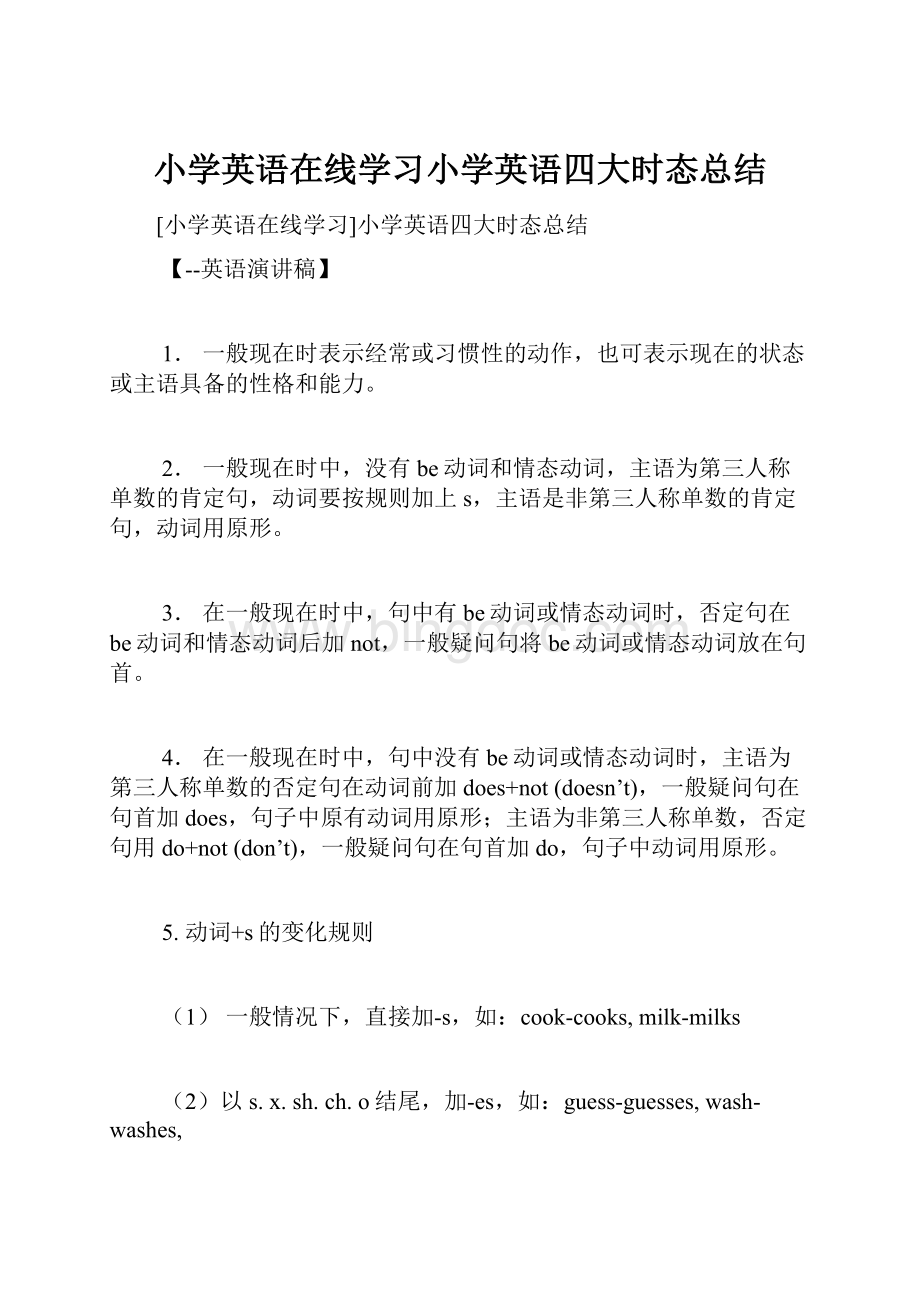小学英语在线学习小学英语四大时态总结.docx
《小学英语在线学习小学英语四大时态总结.docx》由会员分享,可在线阅读,更多相关《小学英语在线学习小学英语四大时态总结.docx(9页珍藏版)》请在冰点文库上搜索。

小学英语在线学习小学英语四大时态总结
[小学英语在线学习]小学英语四大时态总结
【--英语演讲稿】
1.一般现在时表示经常或习惯性的动作,也可表示现在的状态或主语具备的性格和能力。
2.一般现在时中,没有be动词和情态动词,主语为第三人称单数的肯定句,动词要按规则加上s,主语是非第三人称单数的肯定句,动词用原形。
3.在一般现在时中,句中有be动词或情态动词时,否定句在be动词和情态动词后加not,一般疑问句将be动词或情态动词放在句首。
4.在一般现在时中,句中没有be动词或情态动词时,主语为第三人称单数的否定句在动词前加does+not(doesn’t),一般疑问句在句首加does,句子中原有动词用原形;主语为非第三人称单数,否定句用do+not(don’t),一般疑问句在句首加do,句子中动词用原形。
5.动词+s的变化规则
(1)一般情况下,直接加-s,如:
cook-cooks,milk-milks
(2)以s.x.sh.ch.o结尾,加-es,如:
guess-guesses,wash-washes,
watch-watches,go-goes
(3)以“辅音字母+y”结尾,变y为i,再加-es,如:
study-studies
1.现在进行时表示现在正在进行或发生的动作,也可表示当前一段时间内的活动或现阶段正在进行的动作。
2.现在进行时的肯定句基本结构为be+动词ing.
3.现在进行时的否定句在be后加not。
4.现在进行时的一般疑问句把be动词调到句首。
5.动词加ing的变化规则
(1)一般情况下,直接加ing,如:
cook-cooking
(2)以不发音的e结尾,去e加ing,如:
make-making,taste-tasting
(3)如果末尾是一个元音字母和一个辅音字母,双写末尾的辅音字
母,再加ing,如:
run-running,stop-stopping
1.一般将来时表示将要发生的事或打算、计划、决定要做的事情。
2.肯定句:
begoingto+动词原形,如:
Jimisgoingtoplayfootball.否定句:
benotgoingto+动词原形,如:
Jimisnotgoingtoplayfootball.
一般疑问句:
把be动词调到句首,如:
IsJimgoingtoplayfootball特殊疑问句:
疑问词+be+主语+goingto
+动词原形?
如:
WhatisJimgoingtodo
疑问词当主语时:
疑问词+be+goingto+动词原形?
如:
Whoisgoingtoplayfootball
3.begoingto可以与will进行替换。
肯定句:
begoingto+动词原形,如:
Jimwillplayfootball.
否定句:
benotgoingto+动词原形,如:
Jimwillnot(won't)playfootball.
一般疑问句:
把be动词调到句首,如:
WillJimplayfootball
特殊疑问句:
疑问词+be+主语+goingto+动词原形?
如:
WhatwillJimdo
疑问词当主语时:
疑问词+be+goingto+动词原形?
如:
Whowillplayfootball
1.一般过去时表示过去某个时间发生的动作或存在的状态,常和表示过去的时间状语连用。
一般过去时也表示过去经常或反复发生的动作感谢。
2.Be动词在一般过去时中的变化:
⑴am和is在一般过去时中变为was。
(wasnot=wasn’t)⑵are在一般过去时中变为were。
(werenot=weren’t)⑶带有was或were的句子,其否定、疑问的变化和is,am,are一样,即否定句在was或were后加not,一般疑问句把was或were调到句首。
3.句中没有be动词的一般过去时的句子
否定句:
didn’t+动词原形,如:
Jimdidn’tgohomeyesterday.一般疑问句:
在句首加did,句子中的动词过去式变回原形.如:
DidJimgohomeyesterday
特殊疑问句:
⑴疑问词+did+主语+动词原形?
如:
WhatdidJimdoyesterday⑵疑问词当主语时:
疑问词+动词过去式?
如:
Whowenttohomeyesterday
动词过去式变化规则:
1.一般在动词末尾加-ed,如:
pull-pulled,cook-cooked
2.结尾是e加d,如:
taste-tasted
3.末尾只有一个元音字母和一个辅音字母的重读闭音节,应双写末尾的辅音字母,再加-ed,如:
stop-stopped
4.以“辅音字母+y”结尾的,变y为i,再加-ed,如:
study-studied
5.不规则动词过去式:
am,is-was,are-were,do-did,see-saw,say-said,give-gave,get-got,go-went,e-came,have-had,eat-ate,take-took,run-ran,sing-sang,put-put,make-made,read-read,write-wrote,
draw-drew,drink-drank,fly-flew,ride-rode,speak-spoke,sweep-swept,swim-swam,sit-sat
1.Sandy正在弹钢琴。
Sandy______________thepiano.
2.听,她们正在说英语。
Listen,_______are_______English.
3.我正在做家庭作业。
I__________________myhomework.
5.她正在写信吗?
________she_______aletter?
8.ZhangPeng和Tom在树下下棋。
ZhangPengandTom________________chessunderthetree.
9.你们正在植树吗?
_______you________trees?
Yes,weare.
1.Bettydomorningexerciseseveryday.
2.Iplaysonthebeach.
3.Thetreesfallstheirleaves.
4.Iliketowearingshirtsandrunning.
5.Smithiswatertheflowers.
6.Theyusuallyhavesupperatseveno’clock.
7.They’reclimbsatree.
8.Youmustn'tplayfootballhere.
9.Therabbitwantssomevegetables.
10.IsometimeswatchingTVonSunday.
1.____Aliceoftenplaythepiano?
No,she_____.A.Do;doB.Does;doesC.Does;doesn't
2.___yourpenpal__inBei__g?
A.Do;liveB.Do;livesC.Does;live
3.TomandMike__veryexcited,theywilltakeatrip.A.isB.areC.am
4.Ilike________verymuch.Whataboutyou?
A.danceB.dancedC.dancing
5.Thekite____abird.A.looklikeB.islookingC.lookslike
6.BillandI___goodfriends.A.isB.areC.am
7.Sandyoften___hishomeworkonSundays.A.doB.doesC.did
8.Whatdoyouusuallydoontheweekend?
I__________.
A.wentswimmingB.goswimmingC.visitedgrandparents
9.Whatdoyouusuallydoonyourholiday?
Iusually__________.
A.sawelephantsB.singanddanceC.tookpicture
10.I____astudent.Igotoschool____buseveryday.A.is;byB.am;onC.am;by
11.I____abrother.She____asister.A.have;hasB.has;hasC.have;have
12.You____astudent.He____ateacher.A.is;isB.are;isC.are;are
13.Healways_____footballgames.A.watchesB.watchC.doesn't
14.Mybestfriend_____shells.A.collectsB.collectC.often
15.Shedoesn’t_____listeningtothemusic.A.oftenB.likeC.likes
16.MymotherandI___alwayswatchromanticfilms.A.doesn’tB.don’tC.do
17.---When_____hegethomeonFriday?
----HegetshomeatfouronFriday.A.doB.doesC.did
18.Summer_________spring.
A.esafterB.esinC.esbefore
1.MrGreenoften_________inthecountryside.(散步)
2.I________aredbag.Buthe_______ablueone.(有)
7.Motheralways________TVintheevening.(看电视)
本文:
内容仅供参考